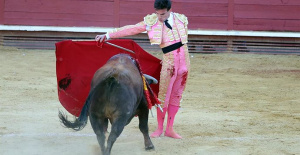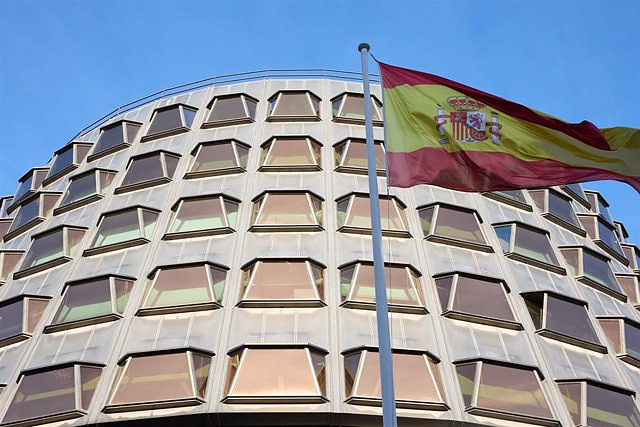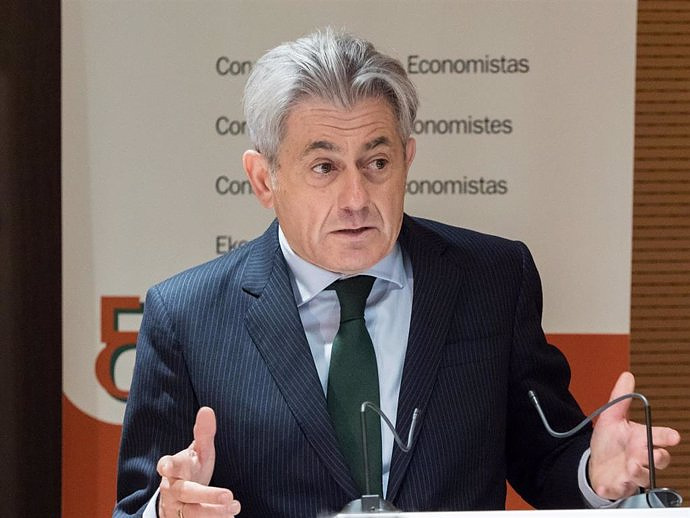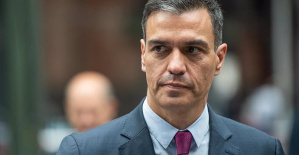The 'popular' want the ex-charge of Moncloa not to participate in the debate on the appeal of the 'socialists'
The PP has asked the Constitutional Court (TC) to separate magistrate Laura Díez from the deliberation on the appeal filed by the PSOE against the decision of the Supreme Court (TS) to reject the request to review some 30,000 invalid votes in the general elections on July 23 in the province of Madrid and to annul the proclamation of the PP leader Carlos García Adanero as elected deputy.
The party led by Alberto Núñez Feijóo has alleged that "the judge was a senior official in the PSOE Government, working under the direct orders of Carmen Calvo and Félix Bolaños", which - in their opinion - would mean an "absence of any appearance of impartiality", as stated by the party in a statement.
The PP has recalled that Díez was appointed Constitutional magistrate "by Sánchez's own Government", and they have stressed that for this reason "her interest in favoring the interests of the PSOE and Minister Bolaños constitute objective elements to fear due to the lack of impartiality ". Thus, he has stressed that the Constitution, the Charter of Fundamental Rights of the European Union and the Universal Declaration of Human Rights include the right to be tried by an independent and impartial court.
Legal sources have confirmed to Europa Press that the court of guarantees has already received the challenge raised by the 'popular', who demand from the court that Díez - as a former Moncloa official - not participate in the debate on the Madrid null votes.
The same sources have specified that, faced with such a request, the Constitutional Court must now first deliberate whether or not to accept the PP's request, which would delay the time scheduled to address and resolve the PSOE's appeal.
According to the sources consulted, the judges of the Second Chamber - with a progressive majority - were scheduled to meet on Monday to rule on the null votes of 23J, after hearing the allegations of the socialists and the Prosecutor's Office, but with the challenge Of the 'popular' ones, it is most likely that the debate will have to be postponed for a few days to first clarify what will happen to Díez.
Regarding this point, however, they have warned that, in any case, the deliberation will take place next week, because it is an electoral protection appeal that must be addressed within the deadlines provided by law.
KEY IN THE INVESTITURE
It was last Tuesday afternoon when the TC agreed to admit the PSOE's appeal for processing by four votes in favor and two against - those of the conservative wing magistrates Enrique Arnaldo and César Tolosa -.
The socialists denounce that the proclamation as elected deputy of García Adanero would have "cut off" the possibility of proclaiming the socialist Javier Rodríguez Palacios, number 11 on the Madrid lists. It is worth remembering that, if it obtained one more seat, the PSOE would have an easier time with a hypothetical investiture of Pedro Sánchez because it would no longer need a vote in favor of Junts, but an abstention would be enough.
The magistrates will evaluate the arguments of the PSOE, which alleged that the Supreme Court's refusal had violated the fundamental right to passive suffrage by "carrying out a restrictive interpretation" of the Organic Law of the General Electoral Regime (LOREG), "with respect to the conduct of the general scrutiny and the possibility of opening all the null votes recorded".
The party also assured that the fundamental right of equal access to elective public positions had been violated, "as a de facto differentiated situation occurred between representatives whose sphere of election is local and those whose sphere of election is provincial or greater." ".
In this sense, the formation insisted in its 25 pages, to which Europa Press had access, that "there is no precept in the LOREG that expressly prohibits claiming the review of invalid votes that, in fact, are in the power of the Board Electoral in the act of general scrutiny as part of envelope number one sent by each polling station."
THE REFUSAL OF THE SUPREME
The formation went before the guarantee court after the Supreme Court considered that "the mere numerical difference in the results that are claimed in this case (1,200 votes) is not a sufficient basis for review."
The judges of the Vacation Chamber considered that no "arithmetic data or reliable statistical calculations had been provided that would allow verifying, even hypothetically, the relevance of the vote review in the final result and in the attribution of the contested seat."
The Supreme Court, contrary to the criteria of the Prosecutor's Office, said that the argument put forward by the PSOE could not be accepted and stressed that it could not be accepted that in this case "the mere adjustment of the result" required the "monitoring or verification of the performance of each Bureau in the performance of its functions".

 Exploring Cardano: Inner Workings and Advantages of this Cryptocurrency
Exploring Cardano: Inner Workings and Advantages of this Cryptocurrency Seville.- Economy.- Innova.- STSA inaugurates its new painting and sealing hangar in San Pablo, for 18 million
Seville.- Economy.- Innova.- STSA inaugurates its new painting and sealing hangar in San Pablo, for 18 million Innova.- More than 300 volunteers join the Andalucía Compromiso Digital network in one month to facilitate access to ICT
Innova.- More than 300 volunteers join the Andalucía Compromiso Digital network in one month to facilitate access to ICT Innova.-AMP.- Ayesa acquires 51% of Sadiel, which will create new technological engineering products and expand markets
Innova.-AMP.- Ayesa acquires 51% of Sadiel, which will create new technological engineering products and expand markets Feijóo, on the UN report: "We are not going to forget either the dictatorship or the terrorist group"
Feijóo, on the UN report: "We are not going to forget either the dictatorship or the terrorist group" A total of 19,887 migrants have arrived in Spain so far this year, 190% more, 15,982 of them in the Canary Islands
A total of 19,887 migrants have arrived in Spain so far this year, 190% more, 15,982 of them in the Canary Islands C-LM, Extremadura or Madrid, among the CC.AA that announce the creation of Bullfighting Awards after the suppression of Culture
C-LM, Extremadura or Madrid, among the CC.AA that announce the creation of Bullfighting Awards after the suppression of Culture Urtasun faces criticism for suppressing the Bullfighting Prize: "I think they represent a minority"
Urtasun faces criticism for suppressing the Bullfighting Prize: "I think they represent a minority" How Blockchain in being used to shape the future
How Blockchain in being used to shape the future Not just BTC and ETH: Here Are Some More Interesting Coins Worth Focusing on
Not just BTC and ETH: Here Are Some More Interesting Coins Worth Focusing on Faraday UPV presents the 'Origin' rocket to exceed 10 km of flight: "It is the beginning of the journey to space"
Faraday UPV presents the 'Origin' rocket to exceed 10 km of flight: "It is the beginning of the journey to space" The Generalitat calls for aid worth 4 million to promote innovation projects in municipalities
The Generalitat calls for aid worth 4 million to promote innovation projects in municipalities UPV students design an app that helps improve the ventilation of homes in the face of high temperatures
UPV students design an app that helps improve the ventilation of homes in the face of high temperatures Ivace and promotes a less invasive device for the early detection of prostate cancer
Ivace and promotes a less invasive device for the early detection of prostate cancer A million people demonstrate in France against Macron's pension reform
A million people demonstrate in France against Macron's pension reform Russia launches several missiles against "critical infrastructure" in the city of Zaporizhia
Russia launches several missiles against "critical infrastructure" in the city of Zaporizhia A "procession" remembers the dead of the Calabria shipwreck as bodies continue to wash up on the shore
A "procession" remembers the dead of the Calabria shipwreck as bodies continue to wash up on the shore Prison sentences handed down for three prominent Hong Kong pro-democracy activists
Prison sentences handed down for three prominent Hong Kong pro-democracy activists ETH continues to leave trading platforms, Ethereum balance on exchanges lowest in 3 years
ETH continues to leave trading platforms, Ethereum balance on exchanges lowest in 3 years Investors invest $450 million in Consensys, Ethereum incubator now valued at $7 billion
Investors invest $450 million in Consensys, Ethereum incubator now valued at $7 billion Alchemy Integrates Ethereum L2 Product Starknet to Enhance Web3 Scalability at a Price 100x Lower Than L1 Fees
Alchemy Integrates Ethereum L2 Product Starknet to Enhance Web3 Scalability at a Price 100x Lower Than L1 Fees Mining Report: Bitcoin's Electricity Consumption Declines by 25% in Q1 2022
Mining Report: Bitcoin's Electricity Consumption Declines by 25% in Q1 2022 Oil-to-Bitcoin Mining Firm Crusoe Energy Systems Raised $505 Million
Oil-to-Bitcoin Mining Firm Crusoe Energy Systems Raised $505 Million Microbt reveals the latest Bitcoin mining rigs -- Machines produce up to 126 TH/s with custom 5nm chip design
Microbt reveals the latest Bitcoin mining rigs -- Machines produce up to 126 TH/s with custom 5nm chip design Bitcoin's Mining Difficulty Hits a Lifetime High, With More Than 90% of BTC Supply Issued
Bitcoin's Mining Difficulty Hits a Lifetime High, With More Than 90% of BTC Supply Issued The Biggest Movers are Near, EOS, and RUNE during Friday's Selloff
The Biggest Movers are Near, EOS, and RUNE during Friday's Selloff Global Markets Spooked by a Hawkish Fed and Covid, Stocks and Crypto Gain After Musk Buys Twitter
Global Markets Spooked by a Hawkish Fed and Covid, Stocks and Crypto Gain After Musk Buys Twitter Bitso to offset carbon emissions from the Trading Platform's ERC20, ETH, and BTC Transactions
Bitso to offset carbon emissions from the Trading Platform's ERC20, ETH, and BTC Transactions Draftkings Announces 2022 College Hoops NFT Selection for March Madness
Draftkings Announces 2022 College Hoops NFT Selection for March Madness























